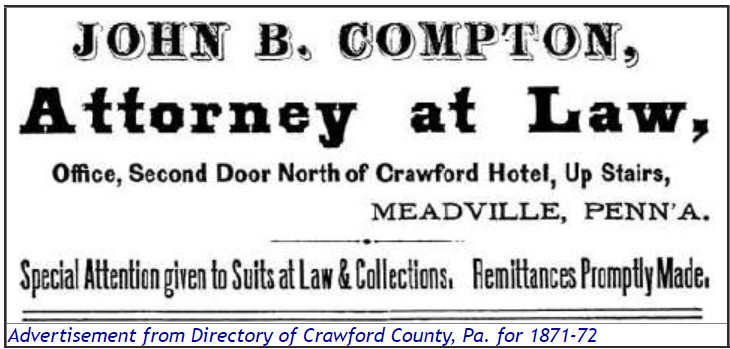Compton, Colonel John Brooks, District Attorney, Meadville, was born November 17, 1835,
in Mead Township, this county, and grew up on the farm of his father, Col. David Compton, attending district school and Meadville Academy. He then
became a teacher, and by that means secured funds to prosecute his studies at Allegheny College, which he entered in the spring of 1858, and
continued a student till his senior year, when he enlisted as a private in the three months’ service, joining the Meadville Grays, which were
stationed at Pittsburgh. He was soon promoted to Sergeant. While in camp, Sergt. Compton wrote his commencement oration, and obtained a furlough
for the purpose of graduating with his class. He committed to memory his oration on his way home in a stage coach, and appeared with his class, June, 1861,
in uniform, at the request of his class and the faculty. Soon after graduation he joined the famous Eighty-third Regiment, Pennsylvania Volunteer Infantry,
as a private, and became First Sergeant of Company F. At the battle of Gaines’ Mill, June 27, 1862, he was wounded, but led his company five days after,
at the battle of Malvern Hill, taking thirty-two men into the fight, of whom eight were killed, and fourteen wounded, himself among the latter. He was
mentioned for gallantry in the dispatches of the Division Commander, and was sent to the hospital at Portsmouth, Va., where he remained until September,
most of the time in a critical condition. He afterward went to Alexandria, and then to Washington, where he was discharged on account of disability from wounds and sickness.

Returning home, after a partial recovery of health, Col. Compton began the study of medicine under Dr. Edward Ellis, of Meadville, but he had to
abandon it on account of continued ill health, and at the suggestion of friends he became a candidate for the Republican nomination for Prothonotary
of the county. Being successful, he was elected in the fall of 1863 by 2,000 majority, and served the entire term. During that time he commanded a
company of Emergency Men, serving until the capture of Morgan and the battle of Gettysburg. He was appointed by Gov. Curtin a Commissioner to take
the vote of the State soldiers in the field for the election of 1864, being assigned to Washington City and vicinity. At the general canvass of the
same year he was assigned to the Army of the Potomac, and was elected Secretary of the Board. In this capacity all the tickets, poll books, etc., had
to pass through his hands. These were sent in due time by express, but were tampered with at Baltimore, or somewhere on the way, so that in order to
obtain them, the Harrisburg officials were telegraphed for a new supply and the Secretary was obliged, with barely time, to visit Washington with a guard,
and watch the precious material till safely landed at City Point, and thus saved to the Slate and Nation the vote of the Pennsylvania soldiers in the
entire Army of the Potomac. During his Prothonotaryship he was entered as a law student by the late Darwin A. Finney, and was admitted to practice June 11, 1868,
which profession and practice he has since continued. He was three times appointed attorney for the county, and is solicitor for the Meadville Loan Association
and other corporations. Col. Compton was appointed by Gov. Hartranft an Aid-de-Camp on his military staff, with the rank of Colonel, and served through his two terms,
when he was re-appointed on his staff, as Major-General of the State, which position he still retains. He was on duty during the Centennial Encampment of the Pennsylvania National Guard,
and on August 10, the date of the great military parade at Philadelphia, was appointed Officer of the Day. As a politician Col. Compton has ever been an active
supporter of the Republican party, both in council and upon the stump. He was Chairman of the Republican County Committee in 1872, and was Senatorial Delegate to the State Convention in 1873.
In 1874 he received the nomination of his party as a candidate for the Legislature by a larger number of votes than any of his colleagues. This was the year of the great political revolution
in the county, the entire ticket being defeated, but Col. Compton getting the highest vote of any Republican candidate. In 1873 he presided as Chairman of the meeting of the Return Judges
of the primary elections. In 1881 he was elected District Attorney of the Thirteenth District, consisting of Crawford County, by the largest majority of any candidate on the
Republican ticket. Col. Compton is a member of the Board of Directors of the Meadville City Hospital; also Past Master Workman of Jefferson Lodge, No. 1, A. 0. U. W.; Past Noble
Grand of Crawford Lodge, No. 734, I. 0. 0. F; for several terms President and Treasurer of the Board of Trustees of the Odd Fellows’ Home of western Pennsylvania;
Commander of Sergeant Peiffer Post, No. 331, G. A. R. He and his family are members of the Second Presbyterian Church, of which he is a Trustee and Secretary. Our subject
was married November 12, 1863, to Fannie E. Kingsley, of Springfield, Mass. Of their family two sons, Herbert K. and Charles K., died in infancy; Kate Leora, a very interesting
and lovely child, died of diphtheria on Christmas eve, 1881, in her twelfth year. The eldest daughter, Gertrude E., now in her sixteenth year, alone remains of this happy family
of children to bless and comfort the parents.
History of Crawford County, Pennsylvania: containing a history of the county, its townships, towns, villages, schools,
churches, industries, etc., portraits of early settlers and prominent men, biographies, history of Pennsylvania, statistical and miscellaneous matter, Chicago: Warner, Beers & Co., 1885, page 720-722.

